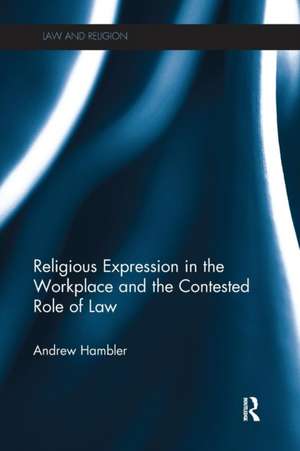Religious Expression in the Workplace and the Contested Role of Law: Law and Religion
Autor Andrew Hambleren Limba Engleză Paperback – 8 noi 2016
The book considers the definition and underlying motives of religious expression, and explores the different ways it may impact the workplace. Andrew Hambler identifies principled responses to workplace religious expression within a liberal state and compares this to the law applying in England and Wales and its interpretation by courts and tribunals. The book determines the extent to which freedom of religious expression for the individual enjoys legal protection in the workplace in England and Wales, and asks whether there is a case for changing the law to strengthen that protection.
The book will be of great use and interest to scholars and students of religion and the law, employment law, and religion and human rights.
| Toate formatele și edițiile | Preț | Express |
|---|---|---|
| Paperback (1) | 466.45 lei 6-8 săpt. | |
| Taylor & Francis – 8 noi 2016 | 466.45 lei 6-8 săpt. | |
| Hardback (1) | 1057.09 lei 6-8 săpt. | |
| Taylor & Francis – 7 noi 2014 | 1057.09 lei 6-8 săpt. |
Din seria Law and Religion
-
 Preț: 315.07 lei
Preț: 315.07 lei -
 Preț: 313.47 lei
Preț: 313.47 lei -
 Preț: 310.70 lei
Preț: 310.70 lei -
 Preț: 318.02 lei
Preț: 318.02 lei - 8%
 Preț: 390.18 lei
Preț: 390.18 lei -
 Preț: 311.61 lei
Preț: 311.61 lei -
 Preț: 312.66 lei
Preț: 312.66 lei -
 Preț: 311.56 lei
Preț: 311.56 lei -
 Preț: 378.08 lei
Preț: 378.08 lei -
 Preț: 379.68 lei
Preț: 379.68 lei -
 Preț: 411.17 lei
Preț: 411.17 lei -
 Preț: 389.96 lei
Preț: 389.96 lei -
 Preț: 393.35 lei
Preț: 393.35 lei -
 Preț: 391.40 lei
Preț: 391.40 lei - 18%
 Preț: 1006.11 lei
Preț: 1006.11 lei -
 Preț: 390.63 lei
Preț: 390.63 lei -
 Preț: 384.22 lei
Preț: 384.22 lei - 17%
 Preț: 259.98 lei
Preț: 259.98 lei -
 Preț: 368.59 lei
Preț: 368.59 lei -
 Preț: 416.22 lei
Preț: 416.22 lei -
 Preț: 393.13 lei
Preț: 393.13 lei - 14%
 Preț: 298.58 lei
Preț: 298.58 lei -
 Preț: 396.40 lei
Preț: 396.40 lei -
 Preț: 322.05 lei
Preț: 322.05 lei -
 Preț: 390.63 lei
Preț: 390.63 lei -
 Preț: 396.47 lei
Preț: 396.47 lei
Preț: 466.45 lei
Nou
Puncte Express: 700
Preț estimativ în valută:
89.27€ • 96.93$ • 74.98£
89.27€ • 96.93$ • 74.98£
Carte tipărită la comandă
Livrare economică 22 aprilie-06 mai
Preluare comenzi: 021 569.72.76
Specificații
ISBN-13: 9781138243231
ISBN-10: 113824323X
Pagini: 273
Dimensiuni: 156 x 234 x 15 mm
Greutate: 0.39 kg
Ediția:1
Editura: Taylor & Francis
Colecția Routledge
Seria Law and Religion
Locul publicării:Oxford, United Kingdom
ISBN-10: 113824323X
Pagini: 273
Dimensiuni: 156 x 234 x 15 mm
Greutate: 0.39 kg
Ediția:1
Editura: Taylor & Francis
Colecția Routledge
Seria Law and Religion
Locul publicării:Oxford, United Kingdom
Public țintă
PostgraduateCuprins
1. Introduction 2. Conceptualising ‘Religious Expression’ in the Workplace 3. Restricting or Guaranteeing Religious Freedom in the Workplace: Legal Models 4. The Effect of the European Convention on Human Rights and its Application 5. The Legislative and Policy Landscape in England and Wales 6. Negative Manifestation 7. Passive Manifestation 8. Active Manifestation 9. Conclusion
Recenzii
"This is an important, incisive and detailed account of the difficulties that religious minorities have in securing their Article 9 rights with respect to employment in the courts."
Professor Anthony Bradney AcSS, FRSA
"This book makes a significant contribution to the current debate on the position of the religious employee in the secular workplace. Its focus on the 'internal viewpoint' of the religious employee is innovative. It will be a valuable resource for those interested in the legal protection of religious expression at work."
Professor Lucy Vickers, Oxford Brookes University
"His study … exposes, with painstaking attention to detail, the arguments for and against law reform in this field. Whilst proposing practical solutions, the study is also rooted in a solid theoretical framework. It offers a major contribution to our understanding of the role of deep-seated motives behind religious expression, in so many of its forms, and does so within the context of a range of theoretical positions."
Professor Norman Doe, Director for the Centre for Law and Religion, Cardiff, and Series Editor of the 'Law and Religion' series at Routledge.
Professor Anthony Bradney AcSS, FRSA
"This book makes a significant contribution to the current debate on the position of the religious employee in the secular workplace. Its focus on the 'internal viewpoint' of the religious employee is innovative. It will be a valuable resource for those interested in the legal protection of religious expression at work."
Professor Lucy Vickers, Oxford Brookes University
"His study … exposes, with painstaking attention to detail, the arguments for and against law reform in this field. Whilst proposing practical solutions, the study is also rooted in a solid theoretical framework. It offers a major contribution to our understanding of the role of deep-seated motives behind religious expression, in so many of its forms, and does so within the context of a range of theoretical positions."
Professor Norman Doe, Director for the Centre for Law and Religion, Cardiff, and Series Editor of the 'Law and Religion' series at Routledge.
Descriere
The role of religion in the secular workplace can be an area of controversy where some employees strongly desire to express their religious beliefs in ways which may bring them into conflict with their employers. The book considers what is meant by religious expression by individual employees before looking at different principled responses to workplace religious expression within a liberal state. The book analyses the law in England and Wales in order to determine the extent to which freedom of religious expression for the individual enjoys legal protection in the workplace in England and Wales, and whether or not there is a case for changing the law to strengthen that protection.
